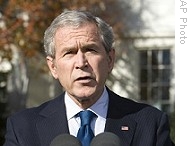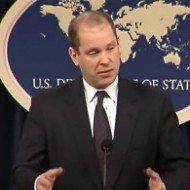voa标准英语2008-Bush Says It is Time for Mugabe to Step Down(在线收听)
 |
| President George W. Bush |
The president's call for the departure of Mr. Mugabe, in a written statement from the White House, was not the first such appeal from a senior U.S. official and followed a similar statement late last week by Secretary of State Condoleezza Rice.
But it appeared to signal a new emphasis in policy for the outgoing administration, which had been urging world pressure on Mr. Mugabe, to engage meaningfully with the opposition on power-sharing.
 |
| Zimbabwean President Robert Mugabe |
The president said Africans from across the continent are beginning to bravely speak out against Mr. Mugabe, who has run the country for nearly 30 years, and he urged others to "join the chorus" for an end to what he termed Mugabe's tyranny.
He said the United States will continue to work with others to halt political violence and stem the humanitarian disaster Mr. Mugabe is inflicting on his country.
Making no mention of power-sharing, the president said the United States stands ready to help rebuild Zimbabwe once a "legitimate" government is formed that reflects the results of elections last March.
The opposition Movement for Democratic Change, the MDC, won the March parliamentary voting and MDC leader Morgan Tsvangirai won the most votes in the first round presidential contest. The country has been in political paralysis since a disputed presidential runoff in June, from which Mr. Tsvangirai withdrew in the face of intimidation and violence against his followers.
Despite a South African-brokered power-sharing agreement with Mr. Tsvangirai in September, Mr. Mugabe has refused to yield significant powers.
 |
| Sean McCormack |
At a news briefing, State Department Spokesman Sean McCormack said the power-sharing process had been a sham.
"We in good faith supported the full implementation of that power-sharing agreement," he said. "Now the MDC has abjured [repudiated] that power-sharing agreement because it wasn't being implemented, because Robert Mugabe and his government did not act in good faith in implementing that power-sharing agreement. So at the end of the day, that was a sham. It was just one more feint to try to stay in power."
McCormack said it is hard to see Zimbabwe being able to lift itself out of the current crisis, with the help of the international system, with Robert Mugabe still in power in Harare.
Asked if Mr. Mugabe should leave the country, the spokesman said the United States was not at the point of prescribing specific actions, but said Zimbabwe needs to move forward "free of the political shackles" of the past.
He again stressed the responsibility of Zimbabwe's neighbors in bringing about an end to the crisis, saying that South Africa and the regional grouping SADC have "unused leverage" at this point.
McCormack reiterated that U.S. humanitarian aid to alleviate hunger and Zimbabwe's cholera epidemic will go forward regardless of governance issues, but said all the country's problems cannot be solved without a resolution of the political crisis.